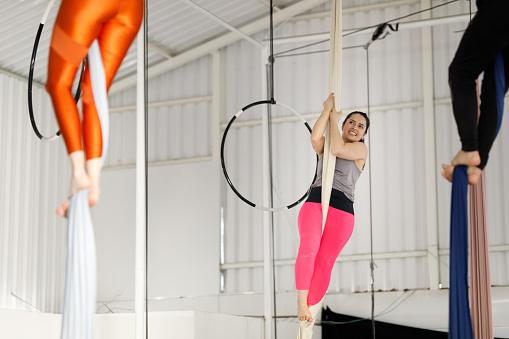This text was written by a TecMundo columnist; Learn more at the end.
We often talk about exercise habits as if making your bed after waking up or brushing your teeth are the same thing. But apparently that’s not the case. The complexity of the behavior is much greater. So, is it possible to develop habits for complex and multifactorial behaviors such as exercise? According to the latest scientific evidence, the answer is yes.
A recently published study showed that: Habit formation is effective in increasing physical activity. However, there are some interesting details in this relationship. Understand here, based on science, how important it is to develop exercise habits, how long it takes, and how it relates to motivation.
Intention alone is not enough
“You just have to want it.” The data tells us it doesn’t work that way. At first glance, going to the gym and working out seems simple. Theoretically, the decision will be made and done. Processes called provocation and execution in habit science. But what is also observed in science is the gap between people’s intentions and their actions. A new analysis of more than 26,000 people found that almost half (47%) of individuals failed to realize the intention to be physically active, meaning the intention turned into action.
What is important in the formation and development of habits?
A new model theorizes that habit formation depends on the presence of 4 antecedents: reward, low behavioral complexity, consistency, and cues. In the case of exercise, these cues seem important because they influence our decisions (incentive) whether to train or not.
Three aspects are important regarding how exercise habits are formed:
- Increase and maintain motivation to be physically active;
- Help translate motivation into repeated action;
- Reinforce the reinforcing value of each repetition in the formation of associations in behavior.
Essentially, the motivation to take action needs to be present at all times, and that means doing it several times. Also, when it comes to exercise, intrinsic rewards, especially, can help strengthen the habit because you feel good during your activity.

Habits and motivation
Research examining 12 different behaviors found that several behaviors, including running and going to the gym (as well as brushing your teeth, drinking alcohol, snacking on chips, smoking, washing your car), have strong habit power. , vacuuming the house, going to the library, playing video games, and calling parents) were partially driven by personal motivation.
Self-determined motivations (those that have one’s own will and are concerned with pleasure and satisfaction) have been associated with automaticity of behavior, which is necessary for habits, as they tend to be driven by little conscious attention and, as a result, occur quickly and efficiently. , with little effort.
The habit with the highest automaticity was brushing your teeth, and the habit with the least automaticity was drinking alcoholic beverages. Complexity of behavior affects the development of automaticity.
People who found behaviors to be more inherently rewarding were more likely to develop stronger habits for those behaviors than those who did not.
The quality of motivation shapes the automaticity of exercise behavior. If your internal motivation is better, In other words, having fun and training while enjoying exercise makes it easier to make it a habit..
Contextual cues, as well as quality motivation, always seem to be a way to direct energy and exercise rather than alternative actions that appear before our eyes: social networks, movies, TV series, videos and others.
So what is your motivation to exercise? Do you have successful educational experiences? This has been shown to be important for improving exercise habits.
How many days does it take to form an exercise habit?
You may have heard of the “21 Day Rule” for creating habits. But this has not been confirmed in science. In a study in PNAS, researchers tracked more than 30,000 gymgoers over the course of a year, analyzing more than 12 million workout sessions.
The estimated time to form the habit (going to the gym) was 122 to 226 days, which is around 4 to 7 months. Contrary to popular belief that there is a magic number of days to develop a habit, It was discovered that if you train in the gym, it takes months.
A longitudinal study of 111 novice gym members over 12 weeks found that participants were more likely to report establishing a physical activity habit if they attended at least four sessions over a 6-week period. Kaushal and Rhodes (2015). Other data shows that it takes an average of 90 days for people to develop the habit of exercising, and this period ranges from 44 to 118 days.
The truth is that there are significant differences between individuals in how quickly habits can be acquired.

Tips for creating exercise habits
Initially, as common sense and also science tells us, the initial period of action is fundamental in the formation of the habit. Remember that there will be days when you have little desire to exercise, but frequency is key to initially building and strengthening the habit.
Especially these days, use a social support strategy that turns exercise into a social activity: invite a friend. The exercise habits of your friends and romantic partners are related to your exercise habits. The tip is this: take care of your social circle, you will influence and be influenced. Let it be with good habits.
At the very least, treat the exercise session as your own space to distract yourself. Also notice how you sleep better on days you exercise and enjoy being in a better mood post-workout; These are immediate results. Researchers suggest: New exercisers should make exercises fun and simple and focus on consistency, which can lead to habit formation.
****
Fábio Dominski He holds a PhD in Human Movement Sciences and a degree in Physical Education from Santa Catarina State University (UDESC). He is a university professor and researcher at the Laboratory of Sport and Exercise Psychology (LAPE/CEFID/UDESC). He is the author of the book Exercising Físico e Ciência – Fatos e Mitos and hosts the program Exercising Físico e Ciência on UDESC joinville radio (91.9 FM); in the program Available as a podcast on Spotify.
Source: Tec Mundo
I’m Blaine Morgan, an experienced journalist and writer with over 8 years of experience in the tech industry. My expertise lies in writing about technology news and trends, covering everything from cutting-edge gadgets to emerging software developments. I’ve written for several leading publications including Gadget Onus where I am an author.











